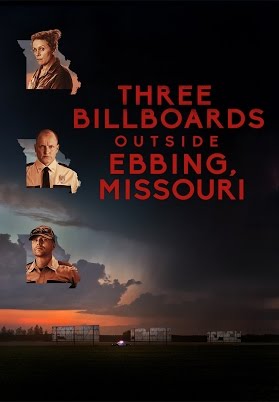
In order to try something new both my girlfriend, Camille and I decided to write a mini review of Three Billboards… Really the experiment is to see what aspects we would tackle. To make sure we don’t influence each other we won’t be seeing each other’s reviews until the post is up.
Camille’s review:
What’s the worst thing that can happen to a person? Being raped & killed is quite bad, but having someone you love raped & murdered is worse, I think. The premise of this film is set out quite plainly, as plainly as a message on a billboard.
Femininity
Strength and femininity are at odds in this narrative. In the scene with Angela, Mildred’s hair is long, but after the murder Mildred’s image changes. Her hair is cut short: shaved at the back, but with a ponytail on top – an amalgamation of masculine and feminine, she wears the same blue overalls, no make up. Did Mildred ‘toughen up’ and become masculine to be strong in her tragedy?
In contrast to Mildred, the male characters show only weakness. Chief Willoughby does not solve the crime. He doesn’t spend his last few months alive trying to find a solution, he gives up and leaves loose ends, he is afraid of pain. Officer Dixon’s weakness frustrates him into violent anger, and he too does not solve the crime.
Town as character
This film takes on a lot of issues that are particularly problematic in the south of the US. There are many references to an outdated way of thinking, on racism and homophobia, and sexism. Are progressive ways of thinking changing the landscape of America? Or is everything staying the same?
Hope
In the end, nobody solves the crime. Girls will be raped, and murdered, and criminals will get away. The world is cruel and nothing has any meaning. Life will go on, we will die, and life will still go on.
My review:
Three Billboards Outside Ebbing, Missouri poses an ethical question: What if an unsolved investigation was exposed to the public in the most outrageous way possible? would there be repercussions? and if so what type?
This is the main plot of Martin McDonagh’s latest film. The main protagonist, Mildred, played excellently by Frances McDormand hires three billboards and pastes the sentences ‘Raped While Dying’ ‘And Still No Arrests?’ and ‘How Come Chief Willoughby?’ Her aim being to coerce the police force to find the person who raped and burnt Mildred’s daughter, which has taken seven months.
At first the plan works but McDonagh throws another ethical problem. Chief Willoughby has cancer and the stress of the billboards is not helping it. Nonetheless Mildred will keep the billboards up.
As a result the police force rebel and Willoughby is getting worse, which results with him committing suicide. We viewers know it’s not the billboards, although as one of his final acts Willoughby pays to keep the billboards up for another month, in order to keep the investigation going AND to get her into further trouble. However Mildred becomes the enemy.
The final ethical question comes from officer Dixon, played by Sam Rockwell, who is superb as the officer who does not behave like someone is to protect law and order: he is a racist, violent, is homophobic and a drunk. By the end of the film he is fired and yet does something which is character worthy and does not get his job back.
Although I want to keep this short. There’s a scene where Mildred gives a speech about culpability, and yet she commits two actions. One is drilling a hole in a dentist’s finger and she denies it. The other act is a form of mistaken revenge and she only admits this to Dixon, who cannot do anything to her.
Was Mildred’s actions correct? should she have put the billboards down in order to help the sick policeman? despite her talk of culpability she refuses to acknowledge her actions, is she a hypocrite for doing so? Although Three Billboards leaves it up to the viewer to decide and rightly so. Ultimately despite what happens life still continues, regardless of our actions.